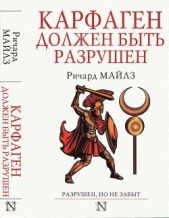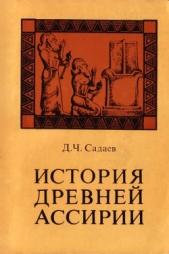Карфаген должен быть разрушен

Карфаген должен быть разрушен читать книгу онлайн
Карфаген…
Наследник цивилизации финикийских мореплавателей, основавших множество колоний.
Богатейший город на западном средиземноморском побережье Африки, обладающий могучим флотом и боеспособной армией.
Торговая держава, господствовавшая в регионе задолго до прихода римлян.
И все же «Карфаген должен быть разрушен!»
Почему не покорен, не завоеван, а именно стерт с лица земли?
По каким причинам существование Карфагена сделалось столь невыносимым для его главного конкурента — молодой Римской республики?
Внимание! Книга может содержать контент только для совершеннолетних. Для несовершеннолетних чтение данного контента СТРОГО ЗАПРЕЩЕНО! Если в книге присутствует наличие пропаганды ЛГБТ и другого, запрещенного контента - просьба написать на почту [email protected] для удаления материала
Rankov, B. 1996 'The Second Punic War at Sea', in Cornell, Rankov & Sabin (eds.) 1996, 49–58
Rawlings, L. 1996 'Celts, Spaniards and Samnites: Warriors in a Soldier's War', in Cornell, Rankov & Sabin (eds.) 1996,81–95
— 2005 'Hannibal and Hercules', in Rawlings & Bowden (eds.) 2005, 153–84
— 2007 'Army and Battle during the Conquest of Italy (350–264 ВС)', in P. Erdkamp (ed.) 2007 A Companion to the Roman Army. Oxford. 45–62
Rawlings, L., & Bowden, H. (eds.) 2005 Herakles and Hercules: Exploring a Graeco-Roman Divinity. Swansea
Reade. J. 1979 'Ideology and Propaganda in Assyrian Art', in Larsen (ed.) 1979, 329–43
Rendeli, M. 2005 'La Sardegna e gli Eubei', in Bernardini & Zucca (eds.) 2005, 91–124
Ribichini, S. 1983 'Mito e storia: l'immagine dei Fenici nelle fonti classiche', in Bartoloni et al. (eds.) 1983, 2:443–8
— 1985 Poenus Advena: gli dei fenici e I'interpretazione classica. Rome
— 1995 'Les Mentalites', in Krings (ed.) 1995, 334–44 Rich, J. 1993 'Fear, Greed, and Glory: The Causes of Roman War-Making in the Middle Republic', in J. Rich & G. Shipley (eds.) 1993 War and Society in the Roman World. London. 46–67
— 1996 'The Origins of the Second Punic War', in Cornell, Rankov &Sabin (eds.) 1996,1–37
Ridgway, D. 1992 The First Western Greeks. Cambridge
— 1994 'Phoenicians and Greeks in the West: A View from Pithek-oussai', in Tsetskhladze & De Angelis (eds.) 1994, 35–46
— 1998 'L'Eubea e l'Occidente: nuovi spunti sulle rotte dei metalli', in M. Bats & B. d'Agostino (eds.) 1998 Euboica: L'Eubea e la pre-senza Euboica in Chalcidice e in Occidente. Naples. 311–22
— 2000 'The First Western Greeks Revisited', in D. Ridgway et al. (eds.) 2000 Ancient Italy in its Mediterranean Setting: Studies in Honour of Ellen Macnamara. London. 179–91
— 2004, 'Euboeans and Others along the Tyrrhenian Seaboard in the 8th Century B.C.', in Lomas (ed.) 2004,15–33
Ridley, R. 1986 'To be Taken with a Pinch of Salt: The Destruction of Carthage', CP, 81: 140–46
Ritter, S. 1995 Hercules in der romischen Kunst von den Anfangen bis Augustus. Heidelberg
Riva, C, & Velia, N. (eds.) 2006 Debating Orientalization: Multidisci-plinary Approaches to Processes of Change in the Ancient Mediterranean. London
Rives, J. 1995 Religion and Authority in Roman Carthage from Augustus to Constantine. Oxford
Robinson, E. 1956 'Punic Coins of Spain and their Bearing on the Roman
Republican Series', in R. A. G. Carson & С. Н. V. Sutherland (eds.) 1956 Essays in Roman Coinage Presented to Harold Mattingly. Oxford
— 1964 'Carthaginian and Other South Italian Coinages of the Second Punic War', Numismatic Chronicle, 7,4: 37–64
Rocco, B. 1970 'Morto sotto le mura di Mozia', Sicilia Archaeologica, 3: 27–33
Rollig, W. 1982 'Die Phonizier des Mutterlandes zur Zeit der Kolo-nisierung', in Niemeyer (ed.) 1982,15–30
— 1992 'Asia Minor as a Bridge between East and West: The Role of the Phoenicians and Aramaeans in the Transfer of Culture', in Kopeke & Tokumaru (eds.) 1992, 93–102
Russell, J. 1991 Sennacherib's Palace without Rival at Nineveh. Chicago
Sabin, P. 1996 'The Mechanics of Battle in the Second Punic War', in Cornell, Rankov & Sabin (eds.) 1996,59–79
Sagona, С 2002 The Archaeology of Punic Malta. Leuven
Sainte-Beuve, C.-A., 1971 'Articles de Sainte-Beuve sur Salammbd', in Gustave Flaubert, Salammbo, (Euvres completes de Gustave Flaubert, vol. 2. Paris
Scheid, J., & Svenbro, J. 1985 'Byrsa, la ruse d'Elissa et la fondation de Carthage', Annates (economies, societes, civilisations), 328–42
Schilling, R. 1954 La religion romaine de Venus, depuis les origines jusqu'au temps d'Auguste. Paris Schmidt, H. 1953 'The Idea and Slogan of “Perfidious Albion” 'Journal of the History of Ideas, 14,4: 604–16
Schmitz, P. 1994 'The Name “Agrigentum” in a Punic Inscription (CISi.5510.10)' Journal of Near Eastern Studies, 53,1:1–13
— 1995 'The Phoenician Text from the Etruscan Sanctuary at Pyr- gi!Journal of the American Oriental Society, 115,4: 559–75
Schulten, A. 1922 Tartessos. Ein Beitrag zur altesten Geschichte des Westens. Hamburg Schurmann, E 1998 'Delenda est Iraq — Why U.S. is on Warpath against Saddam'. http://www.pacificnews.Org/jinn/stories/4.04/
980216-iraq.html
Schwarte, K.-H. 1983 Der Ausbruch des Zweiten Punischen Krieges. Rechtsfrage und Oberlieferung. Weisbaden
Scuderi, R. 2002 'Filino di Agrigento', in Vattuone (ed.) 2002, 275-99
Scullard, H. 1970 Scipio Africanus: Soldier and Politician. London
— 1974 The Elephant in the Greek and Roman World. London
Seibert. J. 1993 Hannibal. Darmstadt
Serrati, J. 2006 'Neptune's Altars: The Treaties between Rome and Carthage (509–226 B.C.)', CQ 56,1:113–34
Shaw J., & Shaw, M. (eds.) 2000 Kommos. Princeton
Shelby Brown, S. 1991 Late Carthaginian Child Sacrifice and Sacrificial Monuments in their Mediterranean Context. Sheffield
Smith, C. 1996 Early Rome and Latium: Economy and Society с 1000 to 500 ВС. Oxford
Snodgrass, A. M. 1971 The Dark Age of Greece. Edinburgh
— 1988 Cyprus and Early Greek History. Nicosia
— 1994 'The Nature and Standing of the Early Western Colonies', in Tsetskhladze & De Angelis (eds.) 1994, 1–10
Snowden, F. M., Jr, 1996 'Bernal's “Blacks” and the Afrocentrists', in Lefkowitz & MacLean Rogers (eds.) 1996, 112–28
Solmsen, E 1986 Aeneas Founded Rome with Odysseus', Harvard Studies in Classical Philology, 90:93–110
Spada, S. 2002 'La storiografia occidentale di eta ellenistica', in Vattuone (ed.) 2002, 233–73
Spencer, D. 2002 The Roman Alexander: Reading a Cultural Myth. Exeter Stager, L. 1982 'Carthage: A View from the Tophet', in Niemeyer (ed.) 1982,155–66
Stager, L., & Wolff, S. 1984 'Child Sacrifice at Carthage: Religious Rite or Population Control?', Biblical Archaeology Review, 10:30–51
Stampolodis, N., & Kotsonas, A. 2006 'Phoenicians in Crete', in S. Deger-Jalkotzy & I. Lemos (eds.) 2006 Ancient Greece from the Mycenaean Palaces to the Age of Homer. Edinburgh. 337–60
Starks, J. 1999 'Fides Aeneia: The Transference of Punic Stereotypes in the Aeneid', Classical Journal, 94: 255–83
Stevens, S. 1988 A Legend of the Destruction of Carthage', CP, 83,1:39–40
Stos-Gale, Z. A., & Gale, N. H. 1992 'New Light on the Provenience of the Copper Oxhide Ingots Found on Sardinia', in Tykot & Andrews (eds.) 1992,317–46
Stram, 1.1992 'Evidence from the Sanctuaries', in Kopeke & Tokumaru (eds.) 1992,46–60
Stubler, G. 1941 Die Religiositdt des Livius. Stuttgart & Berlin
Sumner, G. 1972 'Rome, Spain and the Outbreak of the Second Punic War', Latomus, 31,2:469–80
Sutton, D. 1977 'The Greek Origins of the Cacus Myth', CQ, 27, 2: 391–3
Sutton, J. 2007 'West African Metals and the Ancient Mediterranean', OJA, 2, 2:181–8
Sznycer, M. 1978 'Carthage et la civilisation punique', in C. Nicolet 1978 Rome et la conquete du Monde Mediterraneen 264–27 avant J.-C, vol. 2, Paris. 545–93
Tandy, D. 1997 Warriors into Traders: The Power of the Market in Early Greece. Berkeley
Taylor, J. 1982 A Nigerian Tin Trade in Antiquity?', OJA, 1:317–24
Taylor, P. 1995 Munitions of the Mind: War Propaganda from the Ancient World to the Nuclear Age. Manchester
Thomas, R. 2001 Virgil and the Augustan Reception. Cambridge
Thuillier, J.-P. 1982 'Timbres amphoriques puniques ecrits en lettres grecques', in Actes: Colloque sur la Ceramique Antique. Carthage 23–24 Juin 1980. Tunis Thürlemann-Rappers, S. 1974 'Ceterum censeo Carthaginem esse delendam', Gymnasium, 81: 465–75























